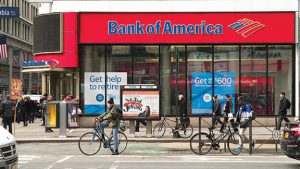Bloomberg
Bank of America Corp, (BofA) tallying its haul from a second banner year for Wall Street securities firms, is shifting its philosophy on bonuses and dramatically sweetening rewards after a bout of restraint a year ago.
Senior executives are planning to increase the bonus pool for investment bankers by more than 40%. And for sales and trading operations, bonuses could rise by an average of more than 30%, one of them said.
That means rewards may climb even faster than some units’ annual revenue growth — and in some cases, even if revenue slipped — a break with the industry’s typical practice. The reason is that executives are considering how businesses performed over the past two years, an era in which many achieved earnings significantly higher than the
pre-pandemic levels.
The juicier payouts come amid mounting competition for talent on Wall Street but also reflect a shift in thinking among Bank of America’s leaders. Last year, they showed caution — keeping the investment bank’s bonus pool flat as other costs rose and amid concern that a flurry of trading and dealmaking set off by the Covid-19 pandemic might not last. The lender had also set aside billions of dollars for the possibility that loans in its massive consumer and corporate
divisions might sour.
But rivals including Goldman Sachs Group Inc and JPMorgan Chase & Co bumped up their bonuses for 2020, leaving Bank of America all the more vulnerable to poaching as Wall Street’s boom continued and a war for talent heated up.
Last month, people familiar with Goldman’s plans said it may go further in the latest round, boosting rewards for bankers about 50%. Even Goldman’s fixed-income traders, who saw their earnings soar in 2020 and then cool a bit in 2021, may have their bonuses held steady this time in a
measure of generosity.
At Bank of America’s trading units, employees handling stocks won’t be the only ones getting larger bonuses — their counterparts in the much larger fixed-income division will too, despite that business’s slump in earnings during 2021. Revenue from equities sales and trading rises about 23% in last year’s first nine months. In fixed
income it falls 9%.
Still, senior executives want to acknowledge that the decline in fixed-income revenue wasn’t as dramatic as drops posted by a number of rivals, and that some parts of the business have been performing particularly well, one of the people said.
Combined, the trading divisions’ revenue rises a mere 2% from a year earlier to $12.3 billion by the end of September. Yet compared with the same period in 2019, the results were elevated significantly — up from below $10 billion.
The plan to reward Bank of America’s investment bankers may help the firm compete for talent alongside the likes of larger rival JPMorgan, which has been discussing raising bonuses for its dealmakers by 30% to 40%.
Bonuses may vary significantly based on individual team performance, with some markedly below the average, the people said. Final figures are still being determined and could change. The company reports fourth-quarter results on January 19. A representative for Bank of America declined to comment.
Chief Executive Officer Brian Moynihan signalled confidence in the firm’s Wall Street earnings at an investor conference last month, predicting that the markets business would achieve full-year results close to 2020’s, which included the best fourth quarter for those operations in a decade or so.
“We’re right around those levels and we’ll see how it ends up,†Moynihan said in early December. The company is scheduled to report its profit from the period on Jan. 19.
The markets business is run by Jim DeMare, who previously led fixed income trading. He assumed his current role in 2020 while guiding desks through some of the most violent price swings in a generation. Soofian Zuberi became the sole head of the global equities business that year as well.
The combined markets segment generated more than $5.2 billion in profit in 2020, up 50% from a year earlier, as Wall Street firms benefited from turmoil caused by the pandemic. DeMare and Koder were granted more responsibilities last year as the company’s longtime Wall Street chief, Tom Montag, prepared to step aside for retirement.
The markets division saw some senior exits in equities amid the pandemic boom, but the firm has since poached from rivals to shore up its ranks and put it on a better competitive footing. The business is benefiting from investments and capital set aside in previous quarters, Moynihan said last month.
 The Gulf Time Newspaper One of the finest business newspapers in the UAE brought to you by our professional writers and editors.
The Gulf Time Newspaper One of the finest business newspapers in the UAE brought to you by our professional writers and editors.
